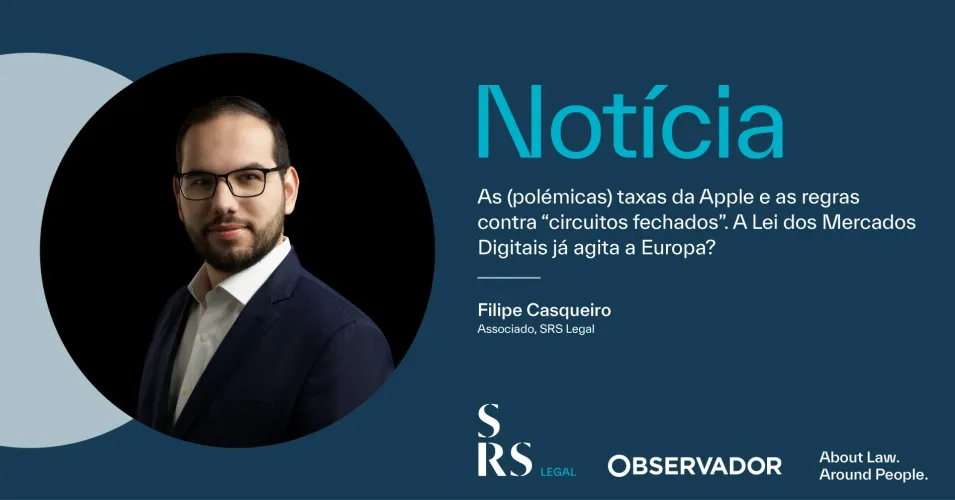Communication
"Apple's (controversial) taxes and the rules against 'closed circuits'. Is the Digital Markets Act already shaking up Europe?" (with Filipe de Oliveira Casqueiro)
«Filipe de Oliveira Casqueiro, an associate in the Technology, Media and Telecommunications department at SRS Legal, says that "the introduction of the possibility of subscribing to a service without having to have an account with another service from the same gatekeeper is in line with the new rules", but points out that "full compliance" depends "always on a careful analysis of all the characteristics" of the product.
[...]
Lawyer Filipe de Oliveira Casqueiro says that technology companies will also "have to collaborate with the European Commission in providing information that is requested of them, including access to any data and algorithms, information on tests and the provision of explanations about their organization, operation, IT system, data processing and commercial practices".
[...]
As these criteria are, according to Filipe de Oliveira Casqueiro, from SRS Legal, "difficult to quantify", others have been established to help classify a company as a gatekeeper: having an annual turnover in the EU of at least 7.5 billion euros in each of the last three years or having at least a market capitalization of 75 billion euros in the "last [financial] year and providing the same essential service in at least three member states"; having more than 45 million monthly active end-users in the EU and more than 10,000 active professional users per year or having "reached these figures in each of the last three years."
[...]
Filipe de Oliveira Casqueiro explains that although Samsung met "the numerical thresholds for the browser to be presumed to qualify as a gatekeeper, it was also able to demonstrate that [the service] is not widely used in the market". In addition, among other things, the technology company allows "the choice of browser, not binding users to theirs", which allowed it to show that "it does not represent an important access for providers to reach end users, nor does it occupy an entrenched position in the market".
[...]
For his part, Filipe de Oliveira Casqueiro, a lawyer at SRS Legal, clarifies that the Brussels document establishes that "at national level it will not be necessary to appoint an entity". "The Competition Authority, as the body responsible for defending competition, will be the European Commission's main interlocutor, coordinating its actions and providing any assistance that may be necessary."
[...]
Before announcing the fees it would charge in the European Union, Apple, following a court ruling, was forced to allow people in the US to subscribe to certain services without using its payment system (by charging developers a 27% fee). At the time, Observador asked Filipe de Oliveira Casqueiro whether the application of future commissions in Europe was in line with the document. Recalling that the legislation is aimed at "neutrality of treatment between products and services", the lawyer says that "setting a commission for the purchase" of services "is not illegal".»



